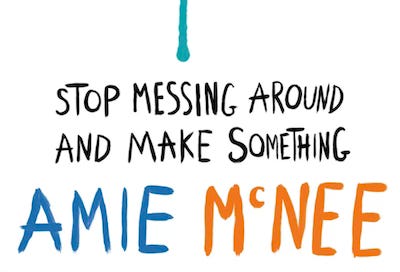"You're Allowed to Have Big Dreams"
THE WEEKLY(ISH) FIVE: Five things for those with ADHD...and those without
We Need Your Art
Do you hesitate to call yourself an artist or worry that you’re not good enough? Do you need a reminder that what you do matters, that you have a right—and what’s more an obligation— to take your art seriously? If so, you need this book. Author Amie McNee isn’t a cheerleader for artists; she’s a kick-ass drill sergeant who insists you live up to your own creative potential and takes no excuses. She makes a compelling case that art is within everyone’s capacity, that we all need to give ourselves permission to let it flourish, and that in doing so we actually change the world. “Creating gives us agency, it gives us control, it gives us delight,” she writes. Moreover, “Making art and sharing it with the world is an act of profound generosity.” The novelist, podcaster, and creative coach has been lighting a fire under her Instagram followers—more than half a million of them!—for years. Now, in We Need Your Art: Stop Messing Around and Make Something, she offers an artist’s manifesto, a two-week reset plan to reignite your passion for your art, and strategies and prompts for disarming the self-sabotaging weapons in every artist’s arsenal, such as perfectionism, jealousy, procrastination, burnout, and imposter syndrome. McNee will make you believe not only that “you are allowed to have big dreams,” but that you must.
Nostalgia and Creativity
On the Creative Health with Daydreamers stack, creative health scientist Katina Bajaj delves into the neurobiology of nostalgia and the surprising way it influences creativity. It’s a fascinating look at an unexpected benefit of looking backward. “Nostalgia,” she writes, “increases activity in our brain’s reward circuits—releasing oxytocin and boosting dopamine, the same neurotransmitters associated with connection, pleasure, and trust.” She explores research into how nostalgia fuels creativity, increasing originality and flexibility and encouraging thinking oriented toward the future. “It lets you tap into a version of yourself that felt free, present, and alive—but without asking you to go backwards. Essentially, it reconnects you with joy, meaning, and possibility.”
The MAHA Commission Report
The Make America Healthy Again Commission, recently created by executive order and chaired by director of Health and Human Services, Robert F. Kennedy, Jr., issued a report on May 22 that immediately drew criticism for its inaccurate representation of ADHD and other conditions experienced by American children and its unsupported conclusion that inadequate nutrition, increased screen time, and environmental toxins are the culprits behind Americans’ diminishing life expectancy. On May 29, according to The Washington Post, “Some of the citations that underpin the science in the White House’s sweeping ‘MAHA Report’ appear to have been generated using artificial intelligence, resulting in numerous garbled scientific references and invented studies, AI experts said Thursday.” Translation: the report cites studies that do not exist. An article in Additude magazine looks at the report’s highlights and sets the record straight. On Youtube, Russell Barkley, PhD, also weighs in.
Brain FM
Brain.fm is a service for functional focus music—neuroscience-based music tailored to specific needs, including ADHD. It’s designed to decrease distraction and improve focus and attention through neural stimulation. The music is created with rapid amplitude modulations that stimulate activity in the brain’s attentional networks. According Brain FM’s website, it’s “shown in peer-reviewed studies to increase focus brainwaves by 119% and improve sustained attention tasks in users with ADHD symptoms.” I tend to be skeptical of apps, so I had low expectations, but in a brief trial, the music did seem to improve attention and focus, though the effect seemed to wear off after a bit. I found it best used for short periods while working on a task that demands focus. An advantage, at least for me, is that unlike other types of music engineered to influence brain waves, such as binaural beats, brain.fm playlists sounds more like ordinary music than electronic compositions. You can give it a 14-day test run for free at brain.fm.
ADHD Mums
You don’t need to be a mum (I’m not) to admire Katy, a Scottish Instagrammer and mum of two who posts clever reels on Instagram and TikTok that she describes as “fully unapproved rules for navigating neurodivergent life.” Diagnosed at 43 and living in a neurodivergent household, she creates spot-on takes of ADHD behaviors that could, considered together, stand as a crash course in understanding the condition. The reels sometimes offer useful strategies for coping with ADHD problems, but I’m following for her droll humor.





good book, We Need Your Art. She’s young, AND she gets it